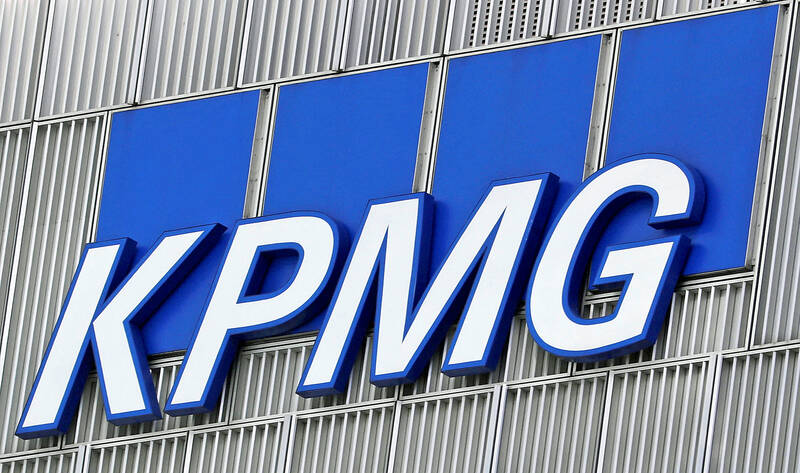More than 80 percent of chief executive officers in Taiwan said they had faith that the nation’s economy would perform well over the next three years, a survey conducted by accounting firm KPMG showed on Jan. 23.
The survey was conducted in August and September last year and included responses from 50 Taiwanese CEOs, who oversaw companies that generated more than US$500 million in revenue a year, KPMG said.
The 50 CEOs spanned 11 major industries including asset management, automobiles, banking, consumption/retail, energy, infrastructure, life science, manufacturing, technology, communications and telecommunications, it said.

Photo: Reuters
About 82 percent of Taiwan’s CEOs reported feeling confident about the economy’s prospects for the next three years, similar to last year’s sentiment, the survey showed.
Taiwan’s figure was higher than the 73 percent of CEOs in the Asia-Pacific region, but lower than the 85 percent of CEOs worldwide, KPMG said.
The survey found that 88 percent of Taiwan’s CEOs said they were confident about the industries they worked in, higher than the 78 percent of CEOs worldwide and 85 percent of CEOs in the Asia-Pacific region.
However, only 52 percent of Taiwan’s CEOs had confidence in the global economy, fewer than 74 percent of CEOs worldwide, and 56 percent in the Asia-Pacific region, it showed.
Taiwan’s CEOs perceived operational issues as the top risk to growth over the next three years (22 percent), KPMG said, referring to operational issues related to uncertainties in enterprises’ day-to-day operations such as inappropriate employee behavior, natural disasters, loopholes in work security and inside fraud.
About 14 percent of the CEOs in Taiwan listed regulatory concerns and emerging or disruptive technologies as the main risk to growth, ahead of cybersecurity (12 percent), and interest rates and supply chain issues (10 percent), KPMG said.
KPMG Taiwan Inc (安侯建業) chairman Jeff Chen (陳俊光) said the business sector has in the past year faced threats resulting from high inflation, aggressive interest rate hikes by major central banks, geopolitical conflicts, regulatory supervision in the environment, sustainability and governance as well as artificial intelligence (AI) development.
As a result, Taiwanese CEOs saw operational issues as the top risk to growth in the latest KPMG survey, up from seventh place the previous year.
Chen said trade tensions as a result of geopolitical uncertainty, a talent shortage and an increase in costs caused by net zero requirements have raised concerns about operational issues this year.
Meanwhile, it was the first time interest rate concerns were among the top 5 concerns of Taiwan’s CEOs, as the government, enterprises and individuals continued to feel the pinch from high inflation and high interest rates, KPMG said.
In Taiwan, 66 percent of CEOs thought rising interest rates and tightening monetary policy could threaten economic growth, compared with 77 percent of global CEOs and 68 percent in the Asia-Pacific region, it said.
In the survey, more than 50 percent of Taiwanese CEOs said they listed generative AI development as their top investment, compared with 70 percent of global CEOs and 67 percent in the Asia-Pacific region.
KPMG said Taiwan’s lower investment in generative AI was because many CEOs thought the technology was still in its infancy and they needed more time to consider before increasing investment.

NEW IDENTITY: Known for its software, India has expanded into hardware, with its semiconductor industry growing from US$38bn in 2023 to US$45bn to US$50bn India on Saturday inaugurated its first semiconductor assembly and test facility, a milestone in the government’s push to reduce dependence on foreign chipmakers and stake a claim in a sector dominated by China. Indian Prime Minister Narendra Modi opened US firm Micron Technology Inc’s semiconductor assembly, test and packaging unit in his home state of Gujarat, hailing the “dawn of a new era” for India’s technology ambitions. “When young Indians look back in the future, they will see this decade as the turning point in our tech future,” Modi told the event, which was broadcast on his YouTube channel. The plant would convert

‘SEISMIC SHIFT’: The researcher forecast there would be about 1.1 billion mobile shipments this year, down from 1.26 billion the prior year and erasing years of gains The global smartphone market is expected to contract 12.9 percent this year due to the unprecedented memorychip shortage, marking “a crisis like no other,” researcher International Data Corp (IDC) said. The new forecast, a dramatic revision down from earlier estimates, gives the latest accounting of the ongoing memory crunch that is affecting every corner of the electronics industry. The demand for advanced memory to power artificial intelligence (AI) tasks has drained global supply until well into next year and jeopardizes the business model of many smartphone makers. IDC forecast about 1.1 billion mobile shipments this year, down from 1.26 billion the prior

People stand in a Pokemon store in Tokyo on Thursday. One of the world highest-grossing franchises is celebrated its 30th anniversary yesterday.

Zimbabwe’s ban on raw lithium exports is forcing Chinese miners to rethink their strategy, speeding up plans to process the metal locally instead of shipping it to China’s vast rechargeable battery industry. The country is Africa’s largest lithium producer and has one of the world’s largest reserves, according to the US Geological Survey (USGS). Zimbabwe already banned the export of lithium ore in 2022 and last year announced it would halt exports of lithium concentrates from January next year. However, on Wednesday it imposed the ban with immediate effect, leaving unclear what the lithium mining sector would do in the